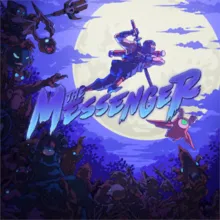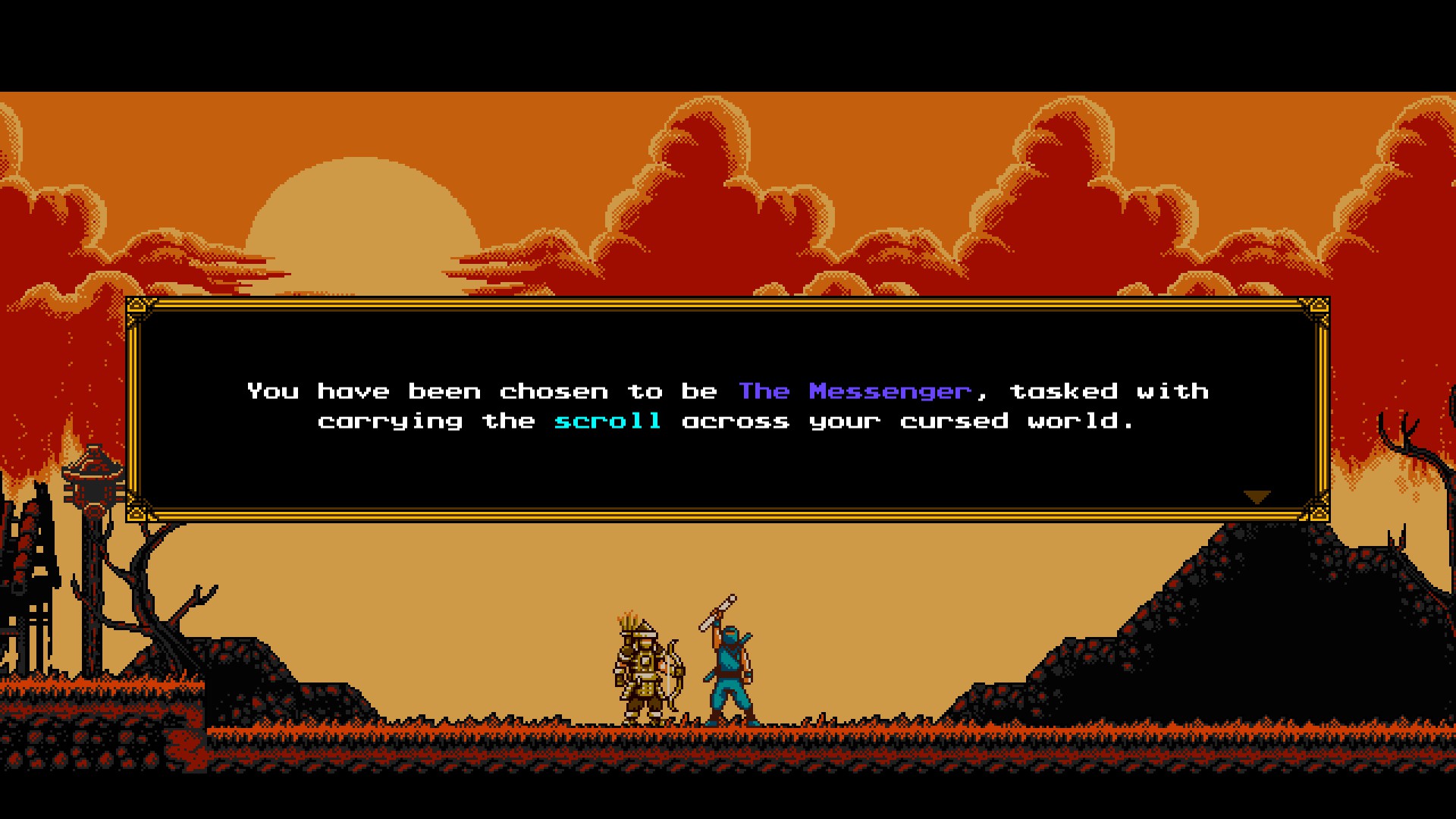Search
[{{{type}}}] {{{reason}}}
{{/data.error.root_cause}}{{{_source.title}}} {{#_source.showPrice}} {{{_source.displayPrice}}} {{/_source.showPrice}}
{{#_source.showLink}} {{/_source.showLink}} {{#_source.showDate}}{{{_source.displayDate}}}
{{/_source.showDate}}{{{_source.description}}}
{{#_source.additionalInfo}}{{#_source.additionalFields}} {{#title}} {{{label}}}: {{{title}}} {{/title}} {{/_source.additionalFields}}
{{/_source.additionalInfo}}- Details
- Category: Computer
- By William Miller
- Hits: 1244
The Messenger (PC)

The Messenger
Developed By: Sabotage Studio
Published By: Devolver Digital
Released: August 30, 2018
Available On: Steam, Nintendo Switch, PS4, Epic Games Store, Microsoft Store, GOG
Genre: Platformer
ESRB Rating: E10+ for Everyone 10 and older: Fantasy Violence
Number of Players: Singleplayer
Price: $19.99
(Humble Store Link)
The Messenger is a 2D pixel art platformer and Sabotage Studio's first game. It starts with the protagonist's ninja village getting attacked by the demon army. All seems lost until the prophesied western hero shows up and chases the demons away. Then, he gives the ninja a scroll and tells him to go to the top of a mountain.
In a game where you can play as a ninja, you'd expect to be able to move like a ninja. The Messenger satisfies this expectation with a simple mechanic that combines movement and combat: cloudstepping. Whenever you strike a lantern or enemy with your sword, you gain a double jump, allowing you to fly through levels with ease. With an upgrade, you can cloudstep with enemy projectiles, and with another upgrade you can attack downwards while gliding. Most enemies die in one hit, adding to the feeling of speed. However, the player is also rather fragile. Without upgrades, spikes will kill the ninja in two hits, and bottomless pits, lava, and crushers are always instakills. This can often be quite frustrating, especially since some of the more difficult rooms require near-perfect execution. Thankfully, the penalty for dying is quite lenient: an imp named Quarble insults you, teleports you back to the last checkpoint, and sticks around to steal all the loot you obtain until either the debt is paid, he gets bored, or a boss scares him away.
The Messenger's controls are rather unconventional, but with time they become familiar. A few design choices are still rather questionable, however. For example, it took me several minutes of trial and error to find out that the alt key is the only way to exit the shop. I later played it with a controller, which is more intuitive, but using A to jump and X to attack is still a little awkward.

Strong Points: Excellent writing and good sense of humor; swift and satisfying blend between platforming and combat; fun boss fights
Weak Points: Frustrating instakills; less interesting dialogue in second half
Moral Warnings: Violence; The word a** is used twice; one of the bosses shows his buttocks during the fight; shopkeeper tells a joke about getting high; DLC takes place on a voodoo-themed island
The Messenger's combat is less varied than the platforming, but is still an important part of the game. At the start, you can only attack to the side, but an upgrade allows you to attack downward while gliding. You can also buy an upgrade that allows you to throw shurikens, but they can only be replenished by lanterns or enemy drops, so they are not very useful against bosses. Most bosses get stunned when you hit them enough, giving opportunities to deal lots of damage. A few have rather annoying instakill attacks, but none of them are prohibitively difficult except for one in the DLC.
While The Messenger may seem to be a typical linear platformer at first, it soon reveals itself as something more when the ninja enters the shop. Far from being a glorified “exchange currency for upgrades” button, the Shopkeeper is a very important character with a lot to say. She often breaks the fourth wall to comment on the current area, upcoming boss, or the game's lore, and you can ask her for a different story on each level. The stories are quite interesting. Some of them stand by themselves, while others have thought-provoking lessons attached. They are always worth reading.

Higher is better
(10/10 is perfect)
Game Score - 84%
Gameplay: 16/20
Graphics: 9/10
Sound: 10/10
Stability: 5/5
Controls/Interface: 3/5
Morality Score - 58%
Violence: 6.5/10
Language: 7/10
Sexual Content: 6/10
Occult/Supernatural: 1/10
Cultural/Moral/Ethical: 8.5/10
Furthermore, there is another mechanic that makes The Messenger stand out: time travel. In the first few levels, the game is 8-bit. However, later on there are sections where you travel to the 16-bit future, where the music sounds different and the ninja wears a really cool hat. The future doesn't just look and sound different, the levels also change. There are quite a few parts where you have to use time travel to get across otherwise impassable obstacles, and even some of the boss fights involve time travel. Unfortunately, the excellent writing starts to dry up in this part, with the shopkeeper's dialogue sticking to the bare minimum exposition.
There are some moral warnings for this game. As previously stated, there is combat, but enemies simply disappear when they die without blood or gore. The word a** is used twice. Two of the bosses wear nothing but a loincloth, and one of them has an attack where he turns away from the camera, then takes it off and uses it as a whip. His buttocks can be seen during this attack. At one point, the shopkeeper tells a joke involving multiple meanings of the word “high”. The DLC takes place on a voodoo-themed island, and its plot involves the antagonist using voodoo magic.
Overall, The Messenger is a very good game with a great sense of humor. However, I would only recommend it to people who already enjoy platformers due to how frustrating some sections can be.






